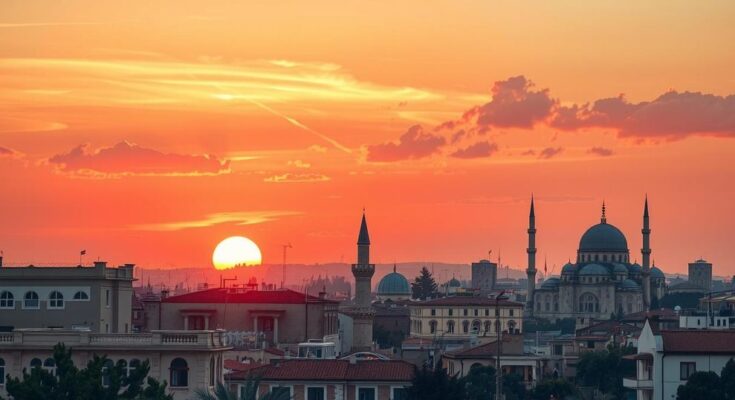The recent lifting of Western sanctions on Syria has sparked hope for improvement in daily life and economic recovery for many citizens. Activists, professionals, and analysts see it as a positive turning point, emphasizing the long path to tangible benefits and infrastructure rebuilding. The situation remains delicate, demanding careful cooperation to fully realize the potential for transformation.
When Western sanctions on Syria were announced to be lifted, some people dared to dream again. Marwah Morhly, a Syrian writer and editor now based in Turkiye, envisioned a brighter future back home in Damascus, where a stable life seemed possible after years of navigating a rough existence cut off from global banking and plagued by uncertainty. She expressed her newfound sense of freedom as one that allows her to envision working from her hometown without the constant fear of exploitation or danger.
Morhly’s hope was echoed by others who had spent years operating in secrecy, like ghost workers, avoiding detection by foreign clients. “We were working in the shadows … like ghosts,” she recalled, struggling to maintain livelihoods under oppressive conditions. However, with the easing of sanctions, the potential for a better life appears more accessible.
The significant shift began on May 13. During a visit to Riyadh, then-US President Donald Trump announced the lifting of sanctions, framing it as a chance for economic recovery. Just ten days later, the US Treasury authorized transactions with Syria’s new transitional government, led by President Ahmad Al-Sharaa. This was accompanied by the suspension of the Caesar Act sanctions for 180 days, paving the way for humanitarian relief and reconstruction efforts.
The European Union wasted no time in aligning with the US initiative, announcing the cessation of its economic sanctions. This concerted effort aims to assist a nation profoundly affected by over a decade-long civil war. In another significant move, Saudi Foreign Minister Prince Faisal bin Farhan Al-Saud recently announced a collaborative effort with Qatar to provide salary support for state employees in Syria, underlining a renewed regional focus on supporting the war-torn nation.
Yet, this policy shift is not a sudden occurrence. Ibrahim Al-Assil from the Middle East Institute highlighted the vital grassroots advocacy that led to this moment. “The Saudi and Turkish roles were huge, and many Syrians appreciate that… but many have been pushing for this change for years,” he noted. Activists, academics, and business leaders have rallied for relief, emphasizing that lifting sanctions can improve day-to-day lives beyond the realm of politics.
For ordinary Syrians, living under sanctions imposed immense challenges in many sectors, from medicine to communication. Now, those barriers are gradually vanishing, allowing individuals to breathe easier. Al-Assil suggested this lifted weight may empower Syrians to progress toward rebuilding their country.
Professionals who remained in Syria during tough times see fresh possibilities. Graphic designer Salma Saleh, for example, has faced endless hurdles throughout her 13-year career due to sanctions. Access to technology was limited, freelancing became nearly impossible, and basic electricity outages presented frequent challenges. “The challenges have been endless,” she stated, emphasizing the resilience required to keep pace with global standards.
Meanwhile, those living in the diaspora view the lifting of sanctions as a potential turning point filled with cautious optimism. Experts suggest that while real progress will take time, it is emerging as a glimmer of hope. According to Lama Beddawi, a Syrian-American analyst, the new sanctions relief hints at an economic revival and improved international investment opportunities.
However, the perspective inside Syria is still complicated. Though there is a sense of hope, daily life remains fraught with challenges. Morhly illustrated that while the lifting of sanctions offers potential, it is not a quick fix. “This isn’t a magic fix — the effects will take time to show,” she remarked. Furthermore, improvements in basic services like electricity might still be on the horizon due to ongoing shortages and infrastructural collapse.
Looking ahead, the managing director of Startup Syria, Mohamed Ghazal, remains cautiously optimistic about translating eased sanctions into benefits like jobs and investments. He warns, however, that practical challenges like a weak banking system and bureaucratic hurdles could slow momentum. “Lifting sanctions can take months,” Ghazal explained. He also identified urgent priorities to kickstart the economy, such as restoring access to the SWIFT payment system and creating a modern investment framework.
Despite these hurdles, some experts believe sanctions relief may unlock trade opportunities. Ghassan Ibrahim, a Syria analyst, suggested that it can help rebuild the foundation needed for long-term growth. “Lifting Western sanctions removes long-standing barriers to Syria joining the global market,” he said, hinting that renewed investor interest could bolster the country’s economy.
The lifting of Western sanctions on Syria presents a hopeful opportunity for many looking to rebuild their lives after years of devastation. Ground-level changes are necessary and expected to unfold slowly, yet the path ahead demands earnest efforts, reforms, and cooperation from all involved. The transition towards a better future hinges on evolving circumstances both within and outside of Syria as the country grapples with its complex challenges.
Original Source: www.arabnews.com




